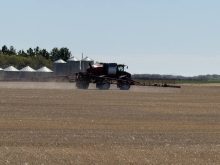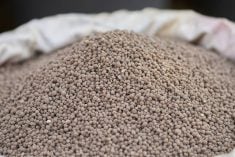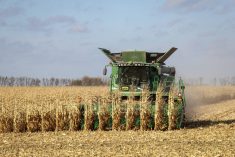The swather and the combine are good places from which to spot weed problems and autumn can be a good time to control winter annual and perennial weeds, says Jeanette Gaultier, weed specialist with Manitoba Agriculture, Food and Rural Development.
Pre-harvest control hinges on the type and stage of weeds and harvest goals. If a farmer wants to quickly dry down green weeds to make harvesting easier applying a desiccant such as diquat makes the most sense, Gaultier said Sept. 16 during the Westman Crop Talk webinar. That’s especially true when dealing with annual weeds.
Read Also

Air, land and sea join forces as Manitoba launches Arctic trade corridor plans
Manitoba wants to take its Arctic trade routes to the big leagues. The Port of Churchill, CentrePort Canada and Winnipeg airport have all raised their hands to help it happen.
“When you apply a systemic (herbicide such as glyphosate to annual weeds) it’s just revenge spraying,” she said. “But when you have winter annuals or perennials and no till then glyphosate is something you look at.”
Cost effective
Glyphosate is cheaper than a diquat. And while glyphosate can take up to two weeks to kill plants, depending on growing conditions, it suppresses or kills many weeds. Diquat dries down green plant tops fast speeding up harvest.
Both Group 22 (diquat) and Group 14 (Heat, AIM) desiccant herbicides require lots of water when applied to crops pre-harvest — 25 and 20 gallons per acre, respectively.
Group 22 products work best under cloudy conditions or when applied in the evening, while Group 14 products perform better under sunny conditions.
Cleavers are a weed farmers might want to control pre-harvest with glyphosate, Gaultier said. It’s normally an annual but can overwinter.
Spraying annual weeds post-harvest is also futile because they’ll die when it freezes, but it can be effective on overwintering annuals and perennials, including thistles. Often perennials are patchy allowing farmers to spot spray and save money, Gaultier said.
Hard to eradicate
Perennials are usually hard to kill with herbicides alone. Farmers should combine them with other measures, such as tillage and crop rotation, including perennial crops.
Post-harvest weeds need to regrow some before a herbicide is applied, Gaultier said. In the case of thistle they should be six to 10 inches tall, but that’s often hard to determine. Four new leaves is another timing guide to go by.
Research has also shown herbicides are more effective on thistles following a “light” frost. However, since that’s almost impossible to forecast, Gaultier recommends spraying when convenient, but before a killing frost. Following a killing frost the top of the plant is dead and can’t absorb the herbicide, she said.
Field horsetail is another tough perennial. It’s not widespread in Manitoba, but “once you have it, you have it forever,” Gaultier said. It prefers sandy, poorly drained soil. The plant is also very competitive and hard to control with herbicides alone, she said.
It’s unclear if glyphosate controls it, Gaultier said. Amitrol and MCPA amine can be effective, while 2,4-D just offers top control. Integrated pest management is recommended for this weed too.
Volunteer canola, especially the Roundup Ready type, is a major weed issue for many farmers. Traditionally, the advice has been to leave canola seed undistributed on the soil surface where it can germinate in the fall or get eaten by birds and insects. However, preliminary research at the University of Manitoba shows lightly harrowing a field stimulates germination, cutting canola volunteer in half.
“That’s pretty significant,” Gaultier said. “If that’s something you have time for it’s something you might want to try.”


















